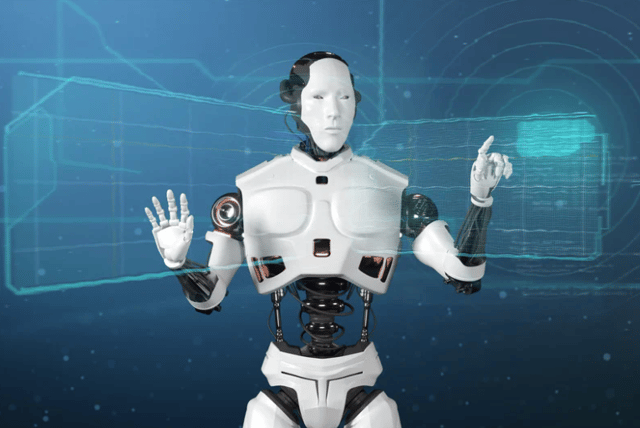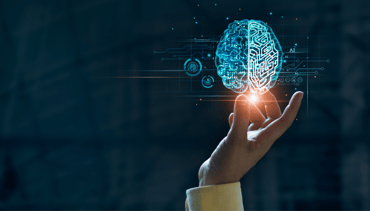In a very short space of time, artificial intelligence (AI) has become way more than just a buzzword, with research highlighting that over 40% of business leaders are increasing their companies’ productivity using AI-driven automation tools.
AI focuses on developing machines designed to think and act like humans. Products built using AI technology can, among many other benefits, enhance customer service, improve revenue forecasting capabilities, speed up decision-making, and raise productivity.
One of the most exciting roles of AI is driving innovation. Generative AI tools like ChatGPT and TensorFlow have already revolutionized the generation of new ideas, while other AI technologies such as machine learning algorithms and neural networks continue to push the boundaries of what's possible across various fields, such as sales, marketing, and customer service.
Read on to find out how AI is revolutionizing businesses through its powerful role in innovation and change.
The Impact of AI on Innovation
AI is already playing a pivotal role in the advancement of innovation, contributing to the introduction of new methodologies while building on old ones to create newer and more improved solutions.
Research indicates that in the past two decades, application-oriented learning research has become increasingly prominent due to advances in deep learning and innovation. This trend is likely to result in a shift away from labor-intensive research toward solutions focused on applying improved prediction algorithms to huge datasets using AI – enabling companies that invest in this technology to innovate more rapidly.
AI can also serve as a bridge between different disciplines as the technology can integrate different datasets, methodologies, and expertise. This collaboration can promote the discovery of novel approaches and innovative solutions that may not have previously been possible.

10 Ways AI is Revolutionizing Business and Innovation
AI is revolutionizing how companies work and innovate in several key areas:
1. Data Analysis
AI uses algorithms and machine learning to examine data patterns, uncover trends, and generate forecasts that are invaluable in business administration.
The types of data analysis that AI can perform include:
- Hindsight: This refers to descriptive analytics that are based on statistical interpretations. AI can use hindsight to analyze historical data and identify patterns and relationships to help businesses understand what has previously been effective and what hasn't.
- Insight: These diagnostic analytics aim to understand the root causes of events, behaviors, and outcomes. Businesses can use this information to better understand their clients.
- Foresight: This refers to predictive analytics about what can happen in the future. AI uses this branch of science to assess the likelihood of success for businesses.
- Context: These prescriptive analytics are used to analyze data and develop an optimal action or strategy to aid business development.
- Inference: This cognitive analysis can be as useful as it is dangerous. AI uses human-like intelligence to accomplish certain tasks like creating algorithms to help businesses do more with less.
2. Managing the Supply Chain
AI-backed solutions can improve supply chain transparency and efficiency, improving the administration of goods, predictions about consumer demand, and delivery processes. This can result in lower expenses, increased output, and higher customer satisfaction. AI can also be used to track shipped products and anticipate delays or interruptions. This can help organizations make more informed decisions and take proactive steps to reduce potential issues.
One example of an AI tool achieving significant progress in the field of supply chain management is HYPE. An online platform designed to seamlessly manage complex supply chain ecosystems, HYPE offers companies easy software solutions enabling them to better innovate and improve their collaboration.
3. Cybersecurity
Leveraging AI technology can significantly enhance businesses’ cybersecurity, through faster detection of viruses, more secure authentication, and increased network security. AI can also analyze vast quantities of statistical information to detect fraudulent activity. By adapting to and learning from new threats over time, AI can also help continuously improve its effectiveness against new methods of cyberattack.
4. Voice and Image Recognition
AI voice recognition, which includes acoustic, pronunciation, and language models, can automate interactions between businesses and their customers, improving efficiency by capturing speech faster than human typing.
Businesses can use one model or a combination of all three to improve their customer service, increase the efficiency of data entry, and create personalized marketing strategies for their customers.
Image recognition works similarly to voice recognition but performs different functions. Here, AI is used for image manufacturing, optical character recognition, and facial recognition to help businesses with areas like product recognition, visual search, and surveillance for security purposes.
5. Advertising and Marketing
AI technology is already revolutionizing how businesses reach out to their potential customers by contributing to more effective advertising and marketing techniques. Companies can use AI-powered solutions to analyze client data and behavior to identify trends and insights that can shape marketing strategies. Using predictive analytics and recommendation engines, AI can fine-tune display adverts, social media marketing, and email promotions. Businesses can use data acquired using AI tools to enhance conversion rates and sales by communicating the correct message to the right person at the right time.
6. Employee Efficiency and Satisfaction
AI can enhance worker efficiency and satisfaction by automating repetitive work, delivering customized instructions, and supplying instantaneous input. Using AI to automate administrative tasks such as data entry, scheduling, and invoicing enables employees to focus on more rewarding tasks to help drive the business's success.
AI can also provide individualized guidance based on each employee's qualifications, skills, and learning styles, helping employees to gain new skills and grow within the organization as well as improving their efficiency and motivation.
7. Predictive Modeling
Over 30% of companies use predictive modeling, a feature of AI technology that uses machine learning algorithms to predict future outcomes and trends.
According to research, nearly 60% of healthcare companies depend on predictive analytics to help develop new services and products for their customers.
Implementing predictive modeling is methodological. It begins with setting a business goal and feeding the AI data to help it develop a statistical model. The model is then tested, evaluated, and implemented to help businesses reach more customers and better understand their needs.
8. Sentiment Analysis
Sentiment analysis uses data to predict future customer trends. AI can assist by recommending preferable services and products to users, analyzing customer demands, and improving delivery and production. In workplace settings, AI can help to interpret employee sentiment to increase satisfaction and retention.
9. Self-governed IT Systems
Using AI, businesses can create an algorithm that functions independently with little to no assistance, helping to enhance performance and minimize human error. These systems can include automated deployment, auto-scaling of cloud resources, DevOps automation, and automatic gathering and analysis of user feedback.
10. Software Testing and Quality Maintenance
AI can accelerate the software testing and maintenance process by executing a high volume of tasks in a short time frame. It can also automate complex workflows and create detailed test reports.










